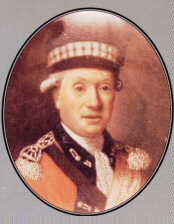Allan Maclean of Torloisk
| Allan Maclean | |
|---|---|
 |
|
| Born |
Allan Maclean 1725 Torloisk near Kilninian, Argyll, Scotland |
| Died | 18 February 1798 London |
| Nationality | British |
| Occupation | British Army officer |
| Employer |
|
| Known for | Battle of Quebec (1775) |
| Title | General |
| Term | 1756–1783 |
| Political party | Jacobite |
| Children | son out of wedlock |
| Parent(s) | Donald Maclean, 5th Laird of Torloisk & Mary (Campbell) Maclean |
| Relatives | Francis McLean |
Allan Maclean of Torloisk (1725–1798) was a Jacobite who became a British Army general. He was born on the Isle of Mull, Scotland. He is best known for leading the 84th Regiment of Foot (Royal Highland Emigrants) in the Battle of Quebec.
Allan was the third son of Donald Maclean, 5th Laird of Torloisk and Mary (Campbell) Maclean, daughter of Archibald Campbell of Sunderland. His other siblings were Hector, Lachlan, Archibald, Mary, Anna, Alicia, Christiana, Betty, and Elizabeth. His family, though titled, was quite poor, the Maclean of Torloisk's property valued at £671 6s. Maclaine begun his military training with the clan as a 17-year-old lieutenant in the Scots Brigade of the Royal Dutch Republic after a brief service as an adjutant.
Participating in the Jacobite rising of 1746, and fighting at the siege of Fort William and Battle of Culloden with the Maclachlans and Macleans battalion, he spent the next four years in exile, including in the service of France during War of the Austrian Succession, again in the Scots brigade in the rank of a lieutenant at Bergen Op Zoom in 1747, where he and Francis McLean were taken prisoner after they were part of the brigade that cut their way through the French lines. Lieutenants Allan and Francis Maclean were then presented before General von Löwenthal, who said to them,
Gentlemen, consider yourselves on parole. If all had conducted themselves as your brave corps have done, I should not now be master of Bergen-op-Zoom.
He returned to Edinburgh in 1750.
On 8 January 1756 he was commissioned a lieutenant, and later travelled to the American colonies with the 62nd, later the 60th Royal America Regiment for two years. After being severely wounded at Ticonderoga on 8 July 1758 while with James Abercromby’s troops taking part in the assault against Montcalm’s forces in Fort Carillon. He served as a temporary captain under Wolfe at the taking of Quebec and on 16 January 1759 was given Captaincy of the Third New York Independent Company, being present at the siege of Niagara in July, where he was again dangerously wounded. While serving in that unit, from 1761 he also begun to participate in raising the 114th Foot (Maclean’s Highlanders), helping to raise six companies when he returned to Scotland, and remaining with it as the Major Commandant until 1763. However the regiment never went on active service, and served only as a source of recruits for other Highland regiments serving in Germany and British America. A number of officers and soldiers from his regiment settled on St John’s (Prince Edward) Island. While Maclean also later received a land grant on the island along with several other Maclean gentry, there is no record of him living there. In 1765 he moved to Paris where he fathered a son out of wedlock, and was recruited by the East India Company. Returning to England not in the rank of a Major, Allan begun to court Janet Maclean in Glasgow whom he had met earlier, and who came to London to be closer to him. At this time he also engaged in writing letters signed "Junius" which appeared in the Public Advertiser, advocating freedom of the press. On 4 February 1771 he wed Janet at the Monkwell Presbyterian Meeting House though she was half his age, which included a piper, at that time still forbidden in London. On 25 May of the following year he was appointed an active lieutenant-colonel in the army with full pay of one pound a day, but was not assigned a battalion, so had no duties to perform. Shortly before that his older brother Lauchlin was appointed Commissary-General of the army in Bengal, and was leaving England with his other brother Harry who had been hired as a secretary in the office of the East India Company in Calcutta. Allan had been close with both, but Lauchlin was still involved with the Jacobites, and this association could hurt his career. At this time a teenage son from Janet's father's second marriage came to live with them and, since they had not been able to conceive a child of their own, Allen revealed his son in France, and Janet agreed to foster the nine-year-old. Wanting to return to active service he eventually secured an audience with the Secretary at War, William Barrington, 2nd Viscount Barrington who refused his resignation to enable him to join the East India Company because the Crown needed officers with experience in the American colonies where trouble was expected over the Townshend Acts and the Stamp Act.
...
Wikipedia
